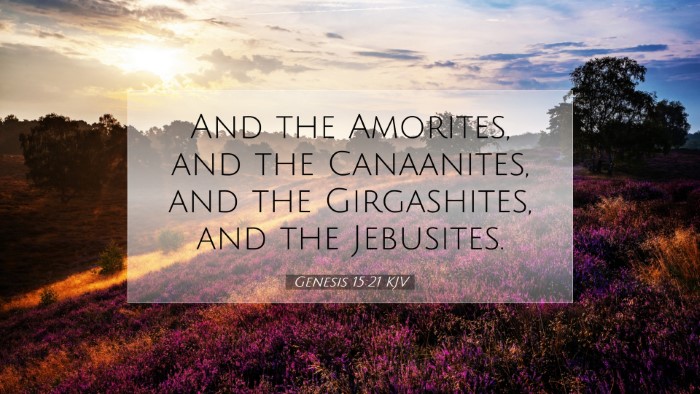Commentary on Genesis 15:21
Genesis 15:21 states: “And the Amorites, and the Canaanites, and the Girgashites, and the Jebusites.” This verse appears within the larger context of God's covenant with Abram, highlighting the nations that will be dispossessed from the land promised to Abram and his descendants. The reference to these specific peoples is not simply a geographical note; it carries significant theological and prophetic implications. The following commentary synthesizes insights from various public domain sources.
Contextual Analysis
The covenant chapter presents God affirming His promises to Abram, who is concerned about his descendants and the legacy he will leave behind. The listing of the Amorites, Canaanites, Girgashites, and Jebusites serves several purposes:
- Identification of Enemies: Each group mentioned symbolizes the opposition that Abram's descendants will face. Matthew Henry notes that these nations were known for their corruption and moral decay, representing not just physical adversaries but spiritual challenges.
- Divine Judgment: The presence of these tribes indicates God's judgment on nations that persist in sin. Albert Barnes emphasizes that these peoples were meant to exhibit a warning to subsequent generations about the costs of disobedience to God.
- Promise and Fulfillment: Adam Clarke points out that while the land is promised to Abram's seed, these nations illustrate the eventual fulfillment of this covenant, as they will be displaced to make way for God’s chosen people.
Historical Significance
Each of the tribes mentioned in the verse plays a significant role in the historical narrative of Israel. Understanding their identities helps to grasp the larger historical context in which the Israelite conquest occurs:
- Amorites: Often mentioned throughout the Old Testament, they were one of the chief adversarial nations against Israel. Their defeat signifies God's power and the triumph of His covenant community.
- Canaanites: The Canaanites are frequently referenced in association with idolatrous practices that influenced Israel negatively. The prohibition against intermarriage with them highlights the need for spiritual purity.
- Girgashites: Literature on the Girgashites is sparse, but they are included in the biblical narrative to indicate the breadth of opposition that Israel would face in their journey towards possessing the Promised Land.
- Jebusites: Known for inhabiting Jerusalem, the Jebusites represent a key target in the later conquest of Canaan. Their stronghold in Jerusalem symbolizes the last vestige of resistance to God’s program.
Theological Implications
Genesis 15:21 serves as a crucial juncture in the narrative of salvation history, pointing to themes that theologians have pondered:
- Covenant Theology: The verse reinforces God's commitment to His covenant. The specific mention of nations underscores that God not only promises land but also the displacement of unworthy occupiers. This reflects God's sovereignty in history.
- Faith and Obedience: The assurance given to Abram incorporates a lesson on the necessity of faith in God's promises, as highlighted by Matthew Henry. It serves to encourage future generations to trust in God's provision and protection.
- Judgment and Mercy: The placement of these nations in impending judgment reminds us of God's justice. Yet, it also highlights His mercy in allowing for repentance before judgment falls, as suggested by Barnes' commentary.
Practical Applications
For pastors and theologians, the implications of Genesis 15:21 can translate into practical ministry applications:
- Understanding Spiritual Warfare: The names of the tribes can be seen as representative of the spiritual battles Christians encounter today. Recognizing these 'oppositional forces' can help believers prepare better for their own spiritual journeys.
- Encouragement in Trials: Just as Abram was assured of God's future victory, believers today can find strength in the promises of God amid trials, trusting that He will deliver on His word.
- Call to Holiness: The moral failures of these nations signal a warning to the Church to strive for holiness and separation from sin, which remains a message relevant throughout the ages.
Conclusion
Genesis 15:21 serves as an essential part of Abram’s journey of faith and showcases God’s intent to establish a covenant people. The listing of these nations encapsulates profound truths about judgment, the sovereignty of God, and the fulfillment of His promises. As we reflect on this passage, may we recognize the historical, theological, and practical implications it bears upon our understanding of God’s unfolding drama in human history.


